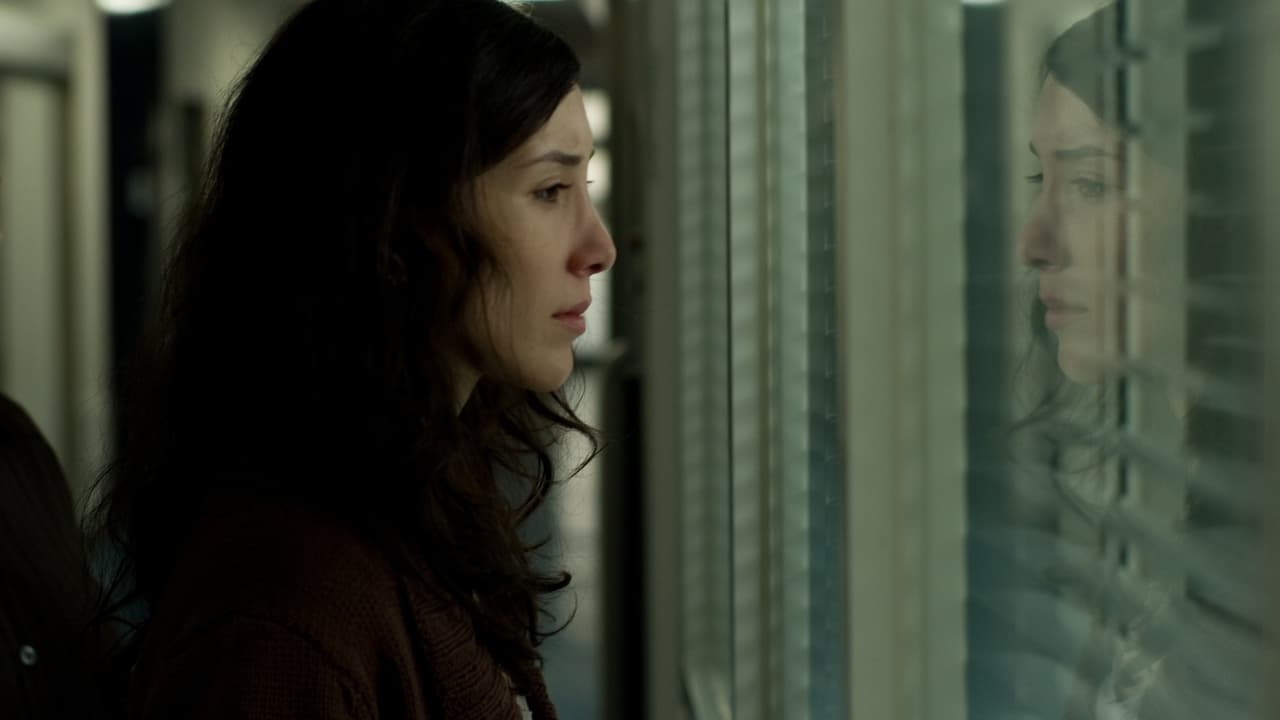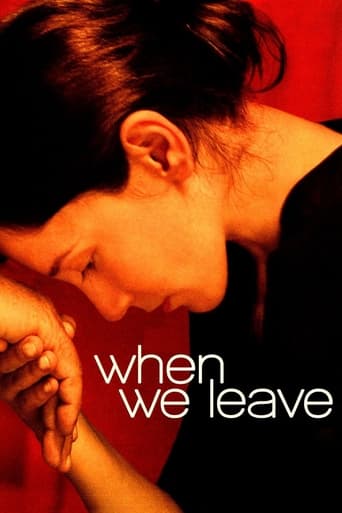

Umay leaves her abusive husband Kemal in Istanbul with her son Cem to go home to Germany. Her father Kader is concerned about the family's honor. The older brother Mehmet is angry. The youngest brother Acar is scared but kind. Kemal rejects Umay but wants his son Cem back. As Kader and Mehmet try to force the situation, Umay calls the police and she escapes with Cem to a women's shelter. She finds a job with a supportive boss and a new boyfriend. Her younger sister Rana is rejected by her fiancee's father due to the situation. Rana tells her mother that she's desperate to marry Duran because she's secretly pregnant. Kader has to pay off the father to get them married. Umay shows up unexpectedly at the wedding and has a meltdown. Even Acar is forced to confront the lost of family honor.The portrait of the lost of family honor is devastating. The pressure feels real. The need for Umay to reconnect with her family does feel unreasonable and excessive. I doubt a reasonable Umay would show up at the wedding. After the wedding, it seems impossible for her to go to the hospital especially carrying her son with her. Then the final scene has too many twists. It only accentuates the twisty manufactured nature of the writing. Writer/director Feo Aladag needs to tone down some of the more melodramatic developments in the last act.
... View More"Die Fremde" or "When We Leave" is a German/Turkish production from 6 years ago. The movie won awards all over the world and was picked as Germany's submission to the Academy Award for the foreign language category. But it was not chosen for a nomination sadly, got snubbed just like "The Edge of Heaven" a couple years earlier. I guess German films with this multi-cultural background just are not to the Academy's liking. Well.. it is their loss as these 110 minutes here are an absolutely outstanding achievement and a truly positive step into filmmaking by writer and director Feo Aladag. And equally much praise from me goes to lead actress Sibel Kekilli, who is in basically every scene of the film and delivers a stunning portrayal as a young Turkish woman/mother whose "terrible" actions (she got divorced, has a German boyfriend, won't give up on her son...) resulted in her being humiliated by her family and becoming an outcast. Yet it is not so easy as she does not want to give up on them and there are moments when they don't seem to give up on her either. It is nice to see that performances like these got her into "Game of Thrones", even if I am not a fan of the series. I hope she can keep having a great career, also abroad. She deserves all the praise and accolades she gets.Umay, the main character, gets humiliated emotionally and occasionally also physically from start to finish here. Kekilli delivers a truly heartbreaking performance of a modern young woman whose love for her son is too big to be able to accept stupid, nonsensical Turkish customs in terms of gender roles. If the man does not want to be with the woman any more, it is all the woman's fault and she has brought shame upon her family. The concept of "Ehrenmord" (honor killings) is just the negative icing on the cake and it is unbelievable that this also still exists today. With stuff like this, it is really hard to feel tolerance and sympathy for immigrants. Of course, I am only referring to these that still believe in the concepts I mentioned before. With the ending, you can argue if a less tragic outcome, maybe with the film ending the moment her brother runs away, may have been better, but it's good both ways I think. Overall, this film is a masterpiece and there is certainly some gigantic irony to the German Film Awards preferring the extremely forgettable "Storm" with a female lead that does not have 1% of Kekilli's greatness. Anyway, "Die Fremde" is an absolute must-see. Highly recommended.
... View MoreThe writer obviously intended to shock the viewers with the surprise ending, and he did, but it ruined the movie. I could have understood murdering the mother (understood, that is, not approved of), but murdering the child just doesn't fit the story. For one thing, male (not female) children were highly valued. For another, the father said he wanted his son (but not his wife) back, and made a feeble attempt to get him back. During that attempt, his father-in-law chastised him, telling him that a physical tug-of-war in the street was not the way to go about it. So, the father-in-law would then approve of killing the boy? Not likely! Now, some people have said that the boy was killed by accident, but that's incredibly sloppy. It would have been easy to kill the mother without harming the child. And, call it bad acting, but the brother's reaction to killing the child did not look like surprise to me! It would have been a far better ending for the mother to pick up the gun off the street and shoot her brother, who was advancing toward her with a knife.
... View MoreAustrian actress Feo Aladag's directorial debut touches upon the concept of "namus" which has been treated many times before. Namus,which is roughly translated as "honor" is a female-bound ethical category in patriarchal societies. It is ostensibly a part of the traditionalist Muslim societies but the concept "namus" actually predates Islam and the Judeo-Christian religion. Regarded as the perfect form of female appropriateness today,namus in time lost its connection with religion and became an expression of hidebound traditionality.What makes this concept a popular subject for the cinema makers is the fact that the very concept does not set any rules for men in uber-conservative societies.In such a society males are supposed to control the women in their families. The fact that men are unaccountable for their actions while women should act perfectly along the line of appropriateness shows that "namus" came to be social mores that has not much to do with religion. In the movie Sibelli Kekilli plays a battered housewife who has been continuously abused by her husband. When she can't take it anymore she decides to go back to her family in Germany. Her family gives her a chilly welcome when they realize she is planning to leave her husband. Presumably from a generation of Gastarbeiter, the family is utterly conservative and a daughter's coming back to family with her kid and ending her marriage is unthinkable for them no matter how violent her husband would be. No matter how many times it has been treated before, the subject is a humanitarian one.It is not difficult to denounce the tartuffery of pious morality but you need to get credits for that. Die Fremde does not exactly offer a thought-provoking portrait of a damsel in distress.It feels like shouting at your face and telling you "I have thought of everything for you." Umay pursues an effectively independent way for herself and her son. She leaves her husband, she even leaves her family when she realizes that they will take her son from her. What does she do then? In spite of the warnings of foster home authorities, she continues to see her family. Though she gets physically attacked by her brother, she goes to her sister's wedding. Is that the way a girl who wants be independent should act? Why should a girl who has found a -sweet,caring boyfriend who wants be a father for her kid- be a pathetic person? Feo Aladag criticizes the stubbornly prejudiced, narrow-minded and inflexible mores of this society but she just indulges in incoherences. When Umay's mother Halime (Derya Alabora) hears that her other daughter Rana (Almila Bagriacik) is pregnant from her boyfriend all she says is "We're ruined." and the father just sighs when her wife says "they must get married". In a family like the one in the movie, Rana is supposed to be killed because of having blemished family's honor. What does the father do? The father chooses to pay the boy's father to get a definite marriage.Instead the family decides to kill the other daughter who can legally get a divorce.Let alone the fact the the characters do not act like a Turk (when the conversation turns into Turkish the characters do not sound as natural as they sound in Turkish.No Turkish-Muslim watches his son's imitative praying instead of following the imam during the salat in the mosque)they do not really give the reactions you expect from a traditionalist family. Sibel Kekilli's acting is superb but the story remains unconvincing,slipping too easily into melodrama and a series of incoherent scenes.
... View More